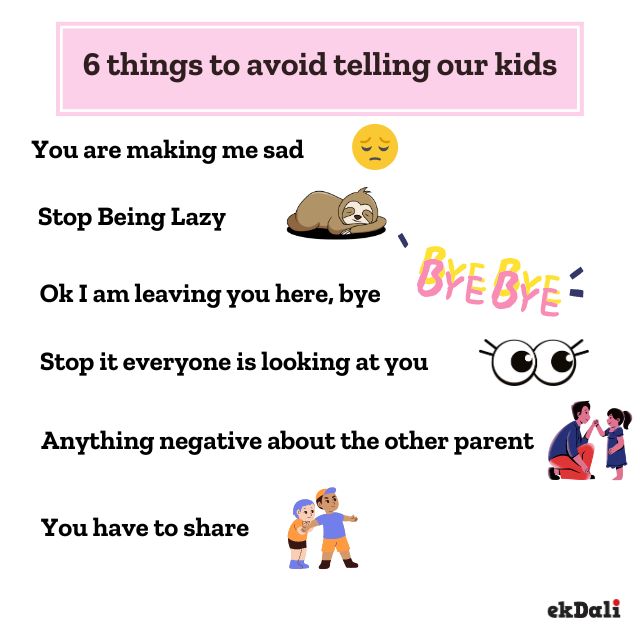Children are writing tapes from the time they are born. These tapes play through their adult life.As parents when we make some statements in crucial situations, we are helping children write their tapes. Some statements we make are positive reinforcements and help children grow into confident adults. There are other statements that can undermine their sense of security and make them underconfident. As parents, we are obviously not making these statements knowing that they are harmful. In fact we end up making these statements in the heat of the moment and not realising the harm these statements are doing.
Listed below are some statements that we make inadvertently that we should try to avoid to raise confident kids
-
You are making me sad
Sometimes when children behave in unexpected ways, we get overwhelmed and make the statement “ You are making me sad”. It might look like a plain and harmless statement, but this statement can have deeper meaning. When we say our kid is making us sad, it somehow makes them feel that they are responsible for our emotions, whereas in reality we are fully responsible for our own emotions. Regulating our emotions in any situation is our responsibility. No one else is responsible for our emotions least of all our children who are themselves so young and learning their emotions
-
Stop Being Lazy
May be we have had a bad and long day and we see that the kid has not cleaned up the toys. She is also refusing to clean up now. In anger and tiredness we tell them to stop being lazy. But we must remember that any labelling, positive or negative we do, is the self talk that kids do. Any form of negative labelling will make their self talk negative and affect their self worth
-
Ok I am leaving you here, bye
Consider this situation. Our kiid is playing in a park or is on a playdate . We are on a tight schedule , but the child is refusing to stop the play and come with us. We get angry and say ok am leaving you here, bye.
First this statement is not factually true. You are not going to let your child anywhere and leave. Secondly, if the child believes it erodes her sense of security . It also reduces the child’s trust in you.
In these situations it is better to try the countdown technique. Where you tell the child that she can play till you count 100. This gives the child time to adjust to the change and is usually very effective
-
Stop it everyone is looking at you
We tend to make this statement when the child is fussing in public. This statement implies that we are embarrassed of our child. It is very damaging to their self worth. It also shifts the locus of the child’s behaviour to other people’s opinion of them. This can lead to people pleasing behaviour in the future
-
Anything negative about the other parent
Sometimes we are in an emotional state. We have had a fight with our spouse and tend to see a lot of negatives. When we include our child in our negative thoughts about our spouse, we are letting two things happen.. One we are hampering the child from forming his or her own independent relationship with the parent. Secondly, we are inadvertently allowing our child to internalise our negative emotions and the child starts to feel guilty about liking and spending time with the other parent
-
You have to share
We say say that sharing is caring and force our kids to share with others. Sharing is a great thing, but you can let your child define what he wants to share and with whom. This is exactly like the concept of private property among adults, we share what we want. In the same way a child’s toys are his property and he can make rules on what to share.
At ekdali, our endeavour is to bring resources to parents to help them be better parents and help families spend as much screen free time as possible. Please check our posters, maps and flash cards which are great ways to keep kids away from the screen
























